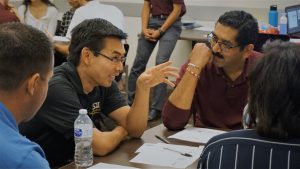How to Help Your Teenager Plan for the Future
March 10, 2023
Planning for the Future 
One common characteristic of successful people is that they learned how to plan for the future when they were very young. Evidence has shown that a person who can plan for the future is more likely to accomplish their goals in life, and also achieve them quicker. However, parents may find that their child is not very good at planning for their future, and they don’t know where to begin to help.
This article has good news and bad news for adults that are trying to help their teenagers plan for their future. The good news is that there are things you can do to help your teenagers move into the future with fewer issues while being more prepared. The bad news is that you can’t really teach your teenagers how to be better at planning for their future. Planning for the future is limited according to a person’s capabilities.
What is Planning for the Future?
To understand how we can help our teenagers plan for the future, we first must understand what it means. Planning has a technical explanation and a theoretical one. Both explanations are important to understand and know because one enables someone to put a plan together, and the other teaches what to put in the plan.
The technical explanation of planning for the future identifies what should be in the plan and how to develop it. As taught in most planning courses, a plan contains the following:
- Schedule – Sequence of events and when they will occur.
- Budget – Identification of finances that are needed and where the finances will come from.
- Risk Mitigation Plan – Identification of things you don’t know or potential issues and what you will do if they occur.
- Resource List – Identification of all the different types of resources and people you will need and what you will need them for.
- Performance metrics – A way you can identify how well you performed.
Theoretically, in order to make the plan and include specific steps, you must have some type of vision for the future. Planning for the future also involves a person’s ability to have an accurate view of where they are headed in their life.
In order to have a good plan for the future, a person needs to be able to first, see a vision of the future, and second, make a step-by-step plan. This is not all-or-nothing, people can have different degrees to which they plan.
Planning for the Future is Not an Easy Thing to Do
It’s important to remember as a parent that planning for the future is not easy. In fact, many adults still struggle with planning. Sometimes as adults, teachers, and parents, we wonder what is so difficult about creating a schedule. Or what is so hard about being productive with your time and doing something that will help with your future? It may seem simple, but planning for the future takes the following capabilities:
- A clear understanding of who you are and what is out there in the world.
- Some knowledge of what it takes to get somewhere. You need to know what talents and skills it takes, what you need to accomplish, and if you need some type of certification, degree, internship, etc.
- An ability to explain your vision and communicate it in a way that takes into account resources, time, money, and steps in chronological order.
 Parents may understand that making a whole plan for the future is too much, but they would like their child to plan enough to do something productive with their time right now. However, it still takes a vision of the future in order for a person to be productive. A vision gives you the motivation to do something, without a vision it is almost impossible to get yourself to do something even if it means helping your future.
Parents may understand that making a whole plan for the future is too much, but they would like their child to plan enough to do something productive with their time right now. However, it still takes a vision of the future in order for a person to be productive. A vision gives you the motivation to do something, without a vision it is almost impossible to get yourself to do something even if it means helping your future.
This means in order for a child to do anything productive with their time, it takes an understanding of what they want, who they are, and what is out there in the world for them. Without that, nothing will be more enticing than a video game they want to play, time on social media, or many things that “waste” their time.
You Can Help Your Child Plan for their Future
The good news is that if your child struggles with being able to plan for their future, you can do it for them. If a child does not have the vision and planning capabilities, an observant parent can make a good plan for them. This way, a plan is created and a child knows what they have to do. As long as the child is capable of doing what the parent has planned, this can help a child be more productive and do things that will help their future.
However, the difference between a parent making a plan and a child making a plan comes down to motivation, ownership, and proper development. Many times, if the parent makes the plan, the child can’t follow it. Even if they do follow it, they may just go through the motions and not achieve as much as kids who help to plan their own future.
 A larger issue appears within their development. When parents make the child’s plans, a child doesn’t go through the steps to figure out who they are, and this can lead to many issues in their future even if they are on the right path. They might end up with regrets or issues feeling forced to do something, or not like what they are doing just because their parents made their plan. Sometimes, when a child is doing “nothing”, it is time they need to sort out in their mind what they really want to do.
A larger issue appears within their development. When parents make the child’s plans, a child doesn’t go through the steps to figure out who they are, and this can lead to many issues in their future even if they are on the right path. They might end up with regrets or issues feeling forced to do something, or not like what they are doing just because their parents made their plan. Sometimes, when a child is doing “nothing”, it is time they need to sort out in their mind what they really want to do.
Another detriment of a parents making the plan is the child doesn’t get the experience of trying to make one. Planning for the future is a skill, and like any other skill, it takes practice to get better at it. Even if a child doesn’t mind if their parent makes their future plan, and they put all of their heart and soul into following it, eventually the parent won’t be there to make the plan for them. This can be a big gap to quickly fill if they don’t have practice planning for their own future.
So, if a child cannot make their own plan, it is okay for a parent to do it. The plan should consider the child’s capabilities, and be a temporary situation. As the child begins to have their own vision and desires for the future, the parent can slowly hand over aspects of the planning process so that the child may gain the skills necessary to plan for the future on their own.
You Can’t Help Them Increase their Capability to Plan
No matter what you do, a child is limited in their ability to plan based on their perception of the world and their understanding and confidence in themselves. Unfortunately, I have found it is really difficult to change this from the outside. It can be frustrating as a parent to have no impact on this.
 I have seen parents introduce their child to many different things in life, put them in many different opportunities to help them find their passion, and spend endless amounts of time trying to talk with their child about the importance of planning and their future. However, if the child is not capable, it has almost no impact. On the other hand, if a child is capable of improving their ability to plan for their future, then a parent will have to do very little. The child will naturally take the lead and begin to plan; as they repeat the planning process they will get better at it.
I have seen parents introduce their child to many different things in life, put them in many different opportunities to help them find their passion, and spend endless amounts of time trying to talk with their child about the importance of planning and their future. However, if the child is not capable, it has almost no impact. On the other hand, if a child is capable of improving their ability to plan for their future, then a parent will have to do very little. The child will naturally take the lead and begin to plan; as they repeat the planning process they will get better at it.
5 Things You Can Do to Help Your Teenager for the Future
So, what can a parent do for their child? Here are five things that I believe really help a child in their future planning:
- Be patient – it may feel as if your child is wasting their life and will not have a future, but try to remember that forming a vision takes time, and learning to plan for the future takes practice. Even your child needs time.
- Allow your child to be themselves – As soon as your child can begin to form a vision of themselves and their lives, they will progress very rapidly and you will see them start to plan for their future really well. It is critical you allow them to be themselves. What does this mean? It means that you try to be as neutral and honest with them as you can. Children can sense if you want them to be good at something, to be a certain way, to act a certain way, or to be friends with certain people. The more they feel your love for them instead of your opinion, the more they will be free to show their true colors and do the things they really love. This will give them a great advantage in getting a good vision for their life and begin planning for their future
- Support them – You might think what they want to do is a “waste” of time, or feel your child might not be going in the right direction, but the more you support them in improving in the ways they want to, the better it will be for your child. It will help them build a good relationship with you, and it is always better for a child who is developing the ability to plan for their future to have a parent on that journey with them. There are things your child might want to do or need to do to prepare for their future that they will need you for such as resources, connections, or as a source of information.
- Get to know your child – The more you know your child, the better advice you can give them. This will also help you to figure out the best combination of making a plan for your child and letting them make their own plan, as well as how you can support them in their plan.
- Make a plan for them – This is not for all children, but sometimes a child will benefit from a parent stepping in, making the plan for them, and telling them what steps to take. This of course is the last resort and only helps some children.
Raising children is challenging and watching a child learn to plan for their future can be one of the toughest parts of it. I hope some of the things talked about in this article can help you along the way.
About the Author
Read Dr. Jacob’s latest book.
Dr. Jacob Kashiwagi is business management consultant and acting Chairman of the Board for Leadership Society of Arizona. Dr. Jacob has worked on 1,100+ industry projects valued at $3.6 billion with a 95% success rate. He has taught over 1,300 college students and 2,500 high school students.

